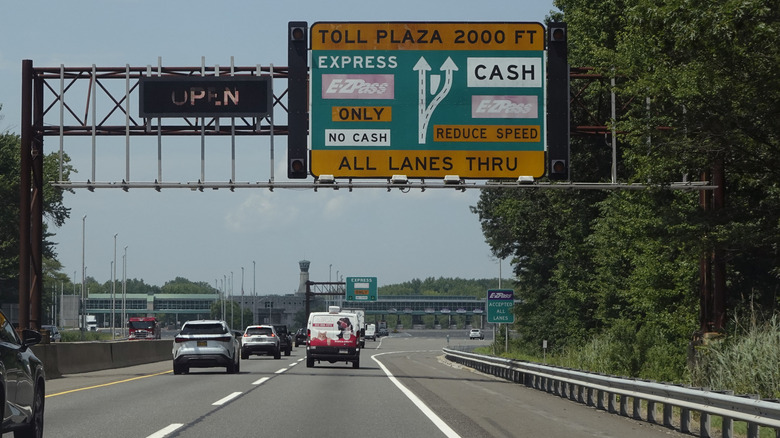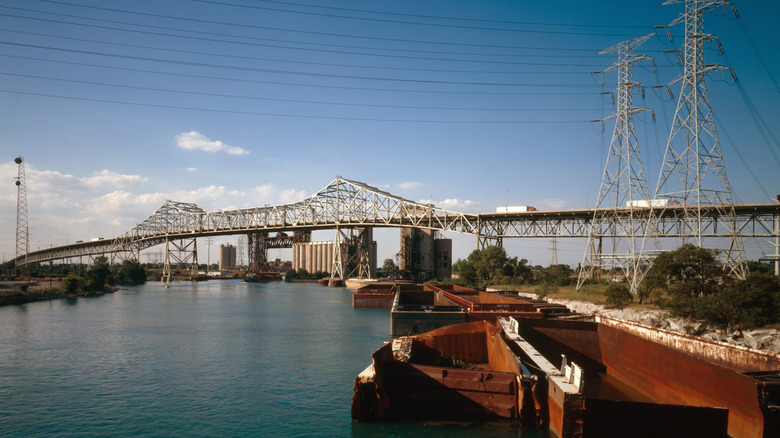Why US Traffic Congestion Is Driving Big Profits For Foreign Companies
There's nothing quite like American roadways. In fact, wide expanses of highways can call out for great vacations on a budget, or even trips to see far-flung friends and family. However, the romance of the road can fade quite quickly during gridlock traffic, leaving some drivers paying tolls in order to cut traffic and travel time off their journey. These traffic-avoiding drivers may not suspect that the tolls they pay are actually going to foreign companies. Some states generate millions, and even billions, in toll-based revenues every year, and while drivers might assume that most of these fees are used to pay off debts related to the roads themselves, the reality is more grim. In fact, ever since the "Great Chicago Sell-Off" in the early 2000s, some of the country's largest toll roads are now owned by foreign investment companies with an eye on making profits.
Built in the early 1950s, the Chicago Skyway — a 7.8 mile toll road and bridge system — was the first U.S. toll road to be privatized, in 2005, by Chicago's Mayor Richard M. Daley. Desperate to balance the city's budget, Daley leased the Skyway for 99 years for the hefty upfront price of $1.8 billion to the Skyway Concession Company, a group comprised of Spain's Ferrovial/Cintra, and Australia's Macquarie Group. This led to not just an immediate spike in toll prices for drivers, but also a disturbing trend of privatization among U.S. toll roads for foreign profit.
The dangers of public roads for private profit
While toll roads have existed since ancient times, U.S. toll roads have long been thought to financially benefit the states and cities that they cut through. However, the foreign investment groups operating many of these roads today have a decidedly different motivation. These groups don't generally have a local interest in keeping costs down, or in merely pricing tolls to cover basic maintenance and repairs. In fact, many of these investors have paid billions for multi-year leases, some as long as 43 or even 99 years. While these groups covering the upfront costs for toll roads may seemingly help state budgets in the short term, over the years millions, or even billions, worth of state revenue can ultimately be lost to these foreign investors — rather than being spent in the states these roads actually run through.
Plus, if a toll road is an attractive private investment, that means that investment can be sold, defaulted on, subject to bankruptcy, or even broken up and sold off piecemeal to other investment groups. This means that public infrastructure is now subject to the inherent dangers present in all private equity funding. The bankruptcies that took down Joann's Fabric and Craft Stores, Toys R Us, and Red Lobster – all rooted in private equity funding issues — are even more terrifying when you consider how the mechanics behind those could someday similarly affect public toll roads.
The Chicago Skyway and other foreign-owned U.S. toll roads
To return to the Chicago Skyway, in 2015, a trio of Canadian pension funds forked over $2.8 billion to buy the remaining years left on the Chicago Skyway lease away from Cintra and Macquarie Group — the companies who originally leased it from Chicago's mayor in 2005. Then, in 2022, Australian firm Atlas Arteria, bought a two-thirds stake of the toll road from the Canadian pension funds for just over $2 billion. This generated around $25 million for the city of Chicago. However, toll charges have steadily climbed higher since the first sale of the road's lease to investment groups, and with valuation showing no signs of diminishing, will likely only climb higher.
Plus, Cintra and the Macquarie Group – who also first leased the nearby Indiana Toll Road in 2006 for $3.8 billion — sold it off in 2015 to IFM Investors for $5.7 billion. At the time of that sale, more than 40 lenders claimed a piece of the Indiana Toll Road's debt. The Macquarie Group also operates Virginia's Dulles Greenway Toll Road and Alabama's Foley Beach Expressway.
Meanwhile, TransCore, a Singaporean company with a Nashville base, even won a contract with New Jersey to run its EZ-Pass toll-collecting system in 2024. Conduent, an actually New Jersey-based company, was TransCore's rival for the 11-year contract. However, despite Conduent's protests that TransCore could impact national security with the data it collects on drivers, the New Jersey Turnpike Authority still granted TransCore the contract in 2025.


